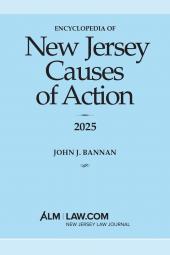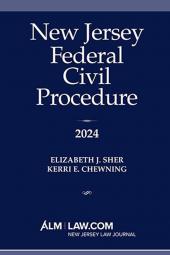New Jersey Trial Evidence and Procedure
Select a format
Sold and shipped by ALM
 International Order Inquiry
International Order Inquiry
Select subscription type
Terms & conditions
Subscribers receive the product(s) listed on the Order Form and any Updates made available during the annual subscription period. Shipping and handling fees are not included in the annual price.
Subscribers are advised of the number of Updates that were made to the particular publication the prior year. The number of Updates may vary due to developments in the law and other publishing issues, but subscribers may use this as a rough estimate of future shipments. Subscribers may call Customer Support at 800-833-9844 for additional information.
Subscribers may cancel this subscription by: calling Customer Support at 800-833-9844; emailing customer.support@lexisnexis.com; or returning the invoice marked "CANCEL".
If subscribers cancel within 30 days after the product is ordered or received and return the product at their expense, then they will receive a full credit of the price for the annual subscription.
If subscribers cancel between 31 and 60 days after the invoice date and return the product at their expense, then they will receive a 5/6th credit of the price for the annual subscription. No credit will be given for cancellations more than 60 days after the invoice date. To receive any credit, subscriber must return all product(s) shipped during the year at their expense within the applicable cancellation period listed above.
The total price includes the product(s) listed in the Order Form and any Updates for a limited period (minimum period of 30 days) after the order is placed ("Order Window"). Shipping and handling fees are not included in the grand total price.
All shipments may be returned, at subscribers' expense, for full credit of the Price within 30 days of receipt.
Shipments may not be returned, and no credits will be issued, more than 30 days after receipt.
After the Order Window, subscribers will receive notice of Updates along with the then-current grand total price and order process as Updates become available. Subscribers will only be shipped those Updates they specifically request.
Product description
View a sample of this title using the ReadNow feature
New Jersey Trial Evidence and Procedure provides a practical and comprehensive presentation of trial evidence as well as procedure, encompassing the rules and laws governing trial found in evidence rules, court rules, court decisions, and Model Civil Jury Charges. This volume provides important practice pointers and insights as to how evidence law plays out in the courtroom for the best chance of success.
The new edition includes important updates on the topics of offer of judgment, affidavit of merit, litigation privilege, expert testimony, peremptory challenges, res ipsa loquitor, Rule 104 hearings, lay expert testimony, hearsay exceptions, the best evidence rule, common law right of access, and judicial recusal. It also features a new chapter on the appellate standards governing review of a jury verdict and trial court decisions.
Many critical evidentiary rules are found only in the New Jersey decisional law—for example, the parol evidence rule, the net opinion rule affecting experts, spoliation of evidence, and the adverse inference charge relating to witnesses, which are identified and discussed in this book.
eBooks, CDs, downloadable content, and software purchases are noncancelable, nonrefundable and nonreturnable. Click here for more information about LexisNexis eBooks. The eBook versions of this title may feature links to Lexis+® for further legal research options. A valid subscription to Lexis+® is required to access this content.
Table of contents
Chapter 1: Trial Calendar and Pretrial Information Exchange
Chapter 2: Selecting a Jury
Chapter 3: Jury Note Taking and Jury Questions
Chapter 4: Opening Statement
Chapter 5: Preliminary Hearing
Chapter 6: Conditional Evidence
Chapter 7: Judicial Notice
Chapter 8: Presumptions
Chapter 9: Relevance, Exclusionary Rules, Limiting Instructions, and Stipulations
Chapter 10: Character Evidence
Chapter 11: Privileges
Chapter 12: Lack of Personal Knowledge
Chapter 13: Order of Interrogation and Presentation of Proofs
Chapter 14: Refreshing Recollection and Past Recollection Recorded
Chapter 15: Questioning and Calling of Witnesses by the Trial Judge
Chapter 16: Sequestration of Witnesses
Chapter 17: Attacking Credibility
Chapter 18: Prior Inconsistent Statement Used to Impeach the Witness
Chapter 19: Prior Inconsistent Statements Admitted for Their Truth
Chapter 20: Prior Consistent Statements and Vouching
Chapter 21: Expert Testimony
Chapter 22: Use of Depositions and Prior Testimony at Trial
Chapter 23: Use of Interrogatory Answers at Trial and Requests for Admissions
Chapter 24: Hearsay
Chapter 25: Authentication of Trial Exhibits
Chapter 26: The Parol Evidence Rule
Chapter 27: Trial Objections
Chapter 28: Closing Statement
Chapter 29: Jury Charge and Verdict Sheet
Chapter 30: Trial Motions
Chapter 31: Punitive Damages
Chapter 32: Spoliation of Evidence
Chapter 33: Offer of Judgment
Chapter 34: Video Transmission of Trial Testimony
Chapter 35: Judge Recusal
Chapter 36: Appellate Standards in Reviewing Jury Verdict and Trial Court Decisions
Table of Cases
Table of Rules, Statutes and Jury Instructions
Index
 Lexis Nexis
Lexis Nexis 

